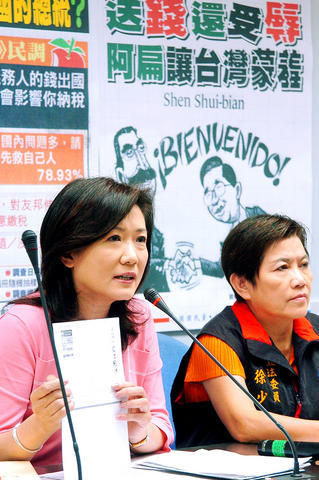The Taiwanese press corps walked out on the leaders' summit of the sixth annual summit of leaders of the nation's Latin American allies -- the highlight of President Chen Shui-bian's (陳水扁) nine-day trip to Central America -- to protest poor treatment by event organizers.
While the event was originally scheduled to begin at 9am, the late arrival of Nicaraguan Vice President Jaime Morales delayed it for about an hour.
The Taiwanese press corps was caught by surprise when the organizer cut off the live broadcast of the summit when Chen was about to speak.

PHOTO: LO PEI-DER, TAIPEI TIMES
The Presidential Office lodged a protest, but was told by the organizer that the broadcast had been halted by order of Honduran President Jose Manuel Zelaya.
While a press conference had been scheduled right after the summit ended, it was delayed for more than two hours.
Furthermore, the organizer had originally arranged for five members of the media to ask questions, including one from Taiwan. They then added two more media to the list, with one from Taiwan and the other from Honduras.
The master of ceremonies, however, called on only two reporters to ask questions -- one from El Salvador and the other from Honduras.
He also interrupted Chen twice, citing time constraints.
After the Presidential Office failed to negotiate for more time, the press corps walked out of the room after Chen made his closing remarks.
Zelaya did not respond when approached by the Taiwanese media for comment.
Chen later apologized to the press corps for the incidents.
Chen told reporters afterward that the press conference scheduled for Tuesday night was canceled because his meeting with Zelaya had taken too long.
Another press conference scheduled for Wednesday afternoon was canceled because he had to rush back to his hotel room to talk with Panamanian President Martin Torrijos Espino on the telephone, Chen said.
As for the treatment the Taiwanese press corps received at the summit press conference, Chen said his understanding was that the Chinese translation of his speech would have taken too long and that the organizer had not deliberately barred the Taiwanese press corps from asking questions.
Chen said he told Zelaya about the press corps' unhappiness and asked him whether he would be interested in jointly answering reporters' questions at the ranch where the two rode horses.
Chen said Zelaya agreed, but the press corps turned down the offer.
Chen came to the press room later in the evening in order to explain further.
Explaining that Latin Americans operate on a more relaxed schedule than Taiwanese, Chen asked reporters to make allowances for local customs.
He said it was wrong to blame Zelaya for what had happened because Zelaya has been very supportive of Taiwan.
Nor was it right to interpret the incident as a form of discrimination or suppression against Taiwan because every national leader has different personality and style, Chen said.

Taiwan is to have nine extended holidays next year, led by a nine-day Lunar New Year break, the Cabinet announced yesterday. The nine-day Lunar New Year holiday next year matches the length of this year’s holiday, which featured six extended holidays. The increase in extended holidays is due to the Act on the Implementation of Commemorative and Festival Holidays (紀念日及節日實施條例), which was passed early last month with support from the opposition Chinese Nationalist Party (KMT) and Taiwan People’s Party. Under the new act, the day before Lunar New Year’s Eve is also a national holiday, and Labor Day would no longer be limited

Taiwan is to extend its visa-waiver program for Philippine passport holders for another year, starting on Aug. 1, Minister of Foreign Affairs Lin Chia-lung (林佳龍) said on Friday. Lin made the announcement during a reception in Taipei marking the 127th anniversary of Philippine independence and the 50th anniversary of the establishment of the Manila Economic and Cultural Office (MECO) in Taiwan, the Ministry of Foreign Affairs said. The decision reflected Taiwan’s commitment to deepening exchanges with the Philippines, the statement cited Lin as saying, adding that it was a key partner under the New Southbound Policy launched in 2016. Lin also expressed hope

Temperatures in New Taipei City’s Sindian District (新店) climbed past 37°C yesterday, as the Central Weather Administration (CWA) issued heat alerts for 16 municipalities, warning the public of intense heat expected across Taiwan. The hottest location in Taiwan was in Sindian, where the mercury reached 37.5°C at about 2pm, according to CWA data. Taipei’s Shilin District (士林) recorded a temperature of 37.4°C at noon, Taitung County’s Jinfeng Township (金峰) at 12:50 pm logged a temperature of 37.4°C and Miaoli County’s Toufen Township (頭份) reached 36.7°C at 11:40am, the CWA said. The weather agency yesterday issued a yellow level information notice for Taipei, New

Costa Rica sent a group of intelligence officials to Taiwan for a short-term training program, the first time the Central American country has done so since the countries ended official diplomatic relations in 2007, a Costa Rican media outlet reported last week. Five officials from the Costa Rican Directorate of Intelligence and Security last month spent 23 days in Taipei undergoing a series of training sessions focused on national security, La Nacion reported on Friday, quoting unnamed sources. The Costa Rican government has not confirmed the report. The Chinese embassy in Costa Rica protested the news, saying in a statement issued the same